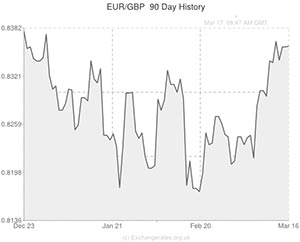
At its last policy meeting the European Central Bank stated that the risk posed by inflation wasn’t strong enough to warrant additional stimulus.
The ECB also intimated that a weaker Euro could help alleviate price pressures before positively revising its growth forecasts for the Eurozone and leaving interest rates unaltered.
The Euro broadly strengthened as a result, but the ECB may have to reconsider its stance in light of today’s inflation report for the 18-nation currency bloc.
The report showed that inflation unexpectedly slowed last month, with consumer prices advancing by 0.7 per cent year-on-year rather than the 0.8 per cent previously forecast.
This is the fifth month the rate has come in below 1 per cent.
Month-on-month prices climbed by 0.3 per cent in February, less than the 0.4 per cent increase expected.
In the Eurostat consumer price report it was observed that negative annual rates were recorded in Bulgaria, Croatia, Cyprus, Greece, Portugal and Slovakia, with annual inflation declining in seventeen members of the EU.
Prices remained stable in three nations and climbed in seven.
The areas which had the biggest negative impact on prices include transport fuels, heating oil and telecommunications.
At the March 6th meeting ECB President Mario Draghi commented that the central bank expects interest rates to remain at current or lower levels for the near future due to ‘an overall subdued outlook for inflation extending into the medium term, given the broad-based weakness of the economy, the high degree of unutilized capacity and subdued money and credit creation.’
Given today’s report the central bank may have to reconsider introducing an additional rate cut in the next few months.
After the report was published the Euro declined against the Pound and US Dollar.
Fears that the referendum in Crimea could lead to conflict between Russia, the US and the EU also pushed investors away from higher-risk assets and kept pressure on the Euro.
In the hours ahead global developments could inspire further Euro to Pound movement, but economists will also be looking ahead to tomorrow’s ZEW economic sentiment surveys for Germany and the Eurozone.
The German sentiment gauge is expected to have fallen from 55.7 in February to 52 in March.
If that proves to be the case the Euro could extend declines as the week continues.
Euro Exchange Rates
[table width=”100%” colwidth=”50|50|50|50|50″ colalign=”left|left|left|left|left”]
Currency, ,Currency,Rate ,
Euro, ,Pound Sterling,0.8359,
,Pound Sterling,0.8359,
Euro, ,US Dollar,1.3897,
,US Dollar,1.3897,
Euro, ,Canadian Dollar,1.5358,
,Canadian Dollar,1.5358,
Euro, ,Australian Dollar,1.5310,
,Australian Dollar,1.5310,
Euro, ,New Zealand Dollar,1.6234 ,
,New Zealand Dollar,1.6234 ,
US Dollar, ,Euro ,0.7196,
,Euro ,0.7196,
Pound Sterling, ,Euro,1.1968,
,Euro,1.1968,
Canadian Dollar, ,Euro,0.6511,
,Euro,0.6511,
Australian Dollar, ,Euro,0.6539,
,Euro,0.6539,
New Zealand Dollar, ,Euro,0.6156 ,
,Euro,0.6156 ,
[/table]

Comments are closed.